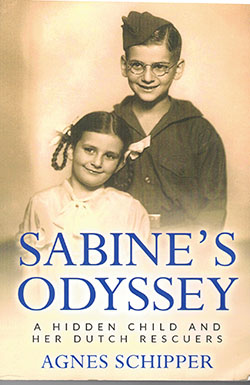 Sabine Fröhlich grew up a Catholic in Breslau, Germany, but her ancestry was Jewish. Along with her parents and her older brother Andreas, she was declared to be a Jew according to the Nazis’ bizarre racial classifications. Like self-identified Jews in Germany, she was systematically excluded from normal life—even the Catholic school which she had attended. Her parents wisely decided to send her to England, but after they made it across the border to the Netherlands, the family reunited.
Sabine Fröhlich grew up a Catholic in Breslau, Germany, but her ancestry was Jewish. Along with her parents and her older brother Andreas, she was declared to be a Jew according to the Nazis’ bizarre racial classifications. Like self-identified Jews in Germany, she was systematically excluded from normal life—even the Catholic school which she had attended. Her parents wisely decided to send her to England, but after they made it across the border to the Netherlands, the family reunited.
Then World War II began and the hoped-for opportunity to immigrate to the Western Hemisphere vanished. Germany overwhelmed the Dutch Army in five days, and the family’s nightmare started anew. Sabine was able to study for a while at a Catholic school in the Netherlands, but with the omnipresent fear of exposure, and with the help of the Dutch Resistance, she moved from family to family in the rural north of Netherlands. She worked as a domestic and as a nanny to earn her keep.
Growing into a young woman, she fell in love with Cor Schipper, one of the Dutch Resistance members who had helped to save her life. Her parents, hidden elsewhere, also survived. But her brother Andreas was arrested during a roundup and sent eventually to the Mauthausen Concentration Camp in Austria, where he perished, by what means his author niece was unable to ascertain from Nazi records.
What makes this book particularly relatable was Agnes Schipper’s ability not only to interview her mother Sabine about her experiences but to read and quote from correspondence that her mother, uncle, and grandparents had exchanged during the years of Nazi terror.
Republished from San Diego Jewish World
Sabine’s Odyssey: A Hidden Child And Her Dutch Rescuers by Agnes Schipper; Amsterdam Publishers, the Netherlands; 9788493-231948; 219 pages, $18.95



























WAS SHE ABLE TO SAVE HER BROTHER? COULD SHE HAVE PULLED STRINGS?? DIDN’T HER. BELOVED HAVDE POWER OR ACCESS TO IT?